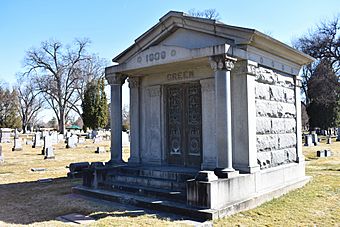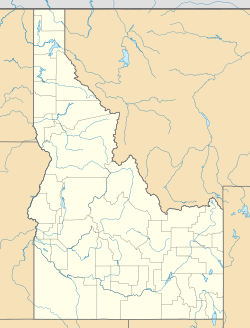John Green Mausoleum facts for kids
Quick facts for kids |
|
|
Green, John, Mausoleum
|
|

The John Green Mausoleum in 2019
|
|
| Location | Morris Hill Cemetery, Boise, Idaho |
|---|---|
| Area | less than one acre |
| Built | 1909 |
| Architect | Tourtellotte,John E. Company |
| Architectural style | Eclectic, Romanesque |
| MPS | Tourtellotte and Hummel Architecture TR |
| NRHP reference No. | 82000205 |
| Added to NRHP | November 17, 1982 |
The John Green Mausoleum is a special stone building in Morris Hill Cemetery in Boise, Idaho. It was built in 1909. This unique tomb was designed by a company called Tourtellotte & Co.. It looks a bit like old Roman buildings, with cool shapes and designs. The mausoleum has strong bronze doors and one window. It was added to the National Register of Historic Places in 1982, which means it's an important historical site.
Who Was John Green?
John Green was born in Germany in 1825. He moved to the United States and became a soldier. He spent 43 years serving in the United States Army. He started as a private and worked his way up. When he retired in 1889, he was a lieutenant colonel. Later, he was honored with the rank of brevet general.
Green's Military Career
John Green fought in many important wars. He was a soldier in the Mexican–American War. He also fought in the American Civil War. After these wars, he took part in battles during the westward expansion of the United States. In 1873, he showed great bravery in the First Battle of the Stronghold. For his actions, he received the Medal of Honor, which is a very high award for soldiers.
Life in Boise
In 1877, John Green took command of Fort Boise in Idaho. A few years later, in 1879, he also commanded Fort Walla Walla. He often moved between these two forts during the 1880s. After retiring from the army in 1889, Green decided to live in Boise. He spent his last years there, though he also visited Germany often. John Green passed away in Boise in 1908.
Building the Mausoleum
After John Green died, his wife wanted a special place for him. She hired Tourtellotte & Co. to build a mausoleum. They designed it to be similar to another tomb nearby, the Joseph Kinney Mausoleum. While John Green's mausoleum was being built, his remains were kept in the Joseph Kinney Mausoleum. In 1910, his remains were moved to his own new mausoleum. This stone building is large enough for four bodies. It was built with strong granite from Baker City and lined with beautiful marble inside.
See also
 In Spanish: Mausoleo de John Green para niños
In Spanish: Mausoleo de John Green para niños



